Movie tie-in games have a well-earned reputation for their fiercely maintained standard of poor quality. I take most advertisements of games such as Transformers: Revenge of the Fallen for PS3 and Star Wars Episode II: Attack of The Clones for PS2 as an extremely expensive PSA distributed by their publishers to serve as a warning to consumers. In fact, only the Star Wars franchise comes to mind as an example of a universe which has successfully traversed into the video game market, a feat accomplished only when they made titles which had nothing to do with the events of the movies. The fact that Middle-earth: Shadow of Mordor did not share a title of an upcoming Peter Jackson film gave me cautious optimism and it was hard not to get excited by the gameplay demos.
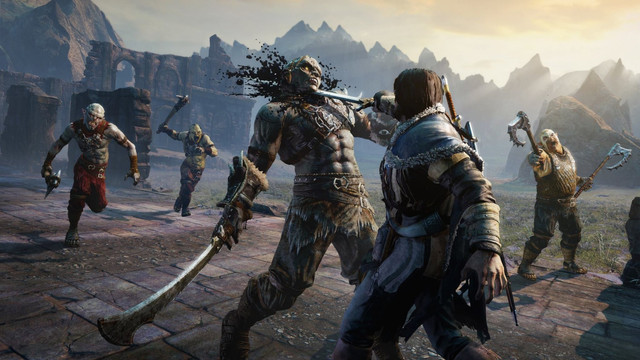
You have my attention
There are many ways you can describe the story and themes in Shadow of Mordor, but I feel the most succinct way to describe events of the game and the player's avatar in the setting is with a simple comparison. Essentially Talion is Middle-earth’s Punisher. In order to exact revenge for the murder of his wife and son, he is on a quest to violently murder every Uruk, Sauron's servitors, and maybe even the big bad himself. It departs a little bit from the formula since Talion becomes cursed, bound to a wraith so he walks the line between the spirit world and the realm of men, but has the added benefit of giving him a lot of neat powers [Editor's note: There was--emphasis on was--an incredibly stupid Punisher storyarc just like this]. Like Frank Castle, Talion is also aware of the structure of the Uruk’s military and specifically targets the leadership to kill them or undermine the organizations command structure. Since Talion is just a single human (sort of) against what is essentially an endless army, he has to fight smart. Uruk Captains lead the troops, and Warchiefs command the captains. Each Warchief has subordinate Captains linked to them and Captains will get in power struggles with each other to climb in the ranks. For all their faults, Uruks run a strong meritocracy in which there is essentially no limit to your upward mobility so long as you are willing and able to murder the person giving you orders.
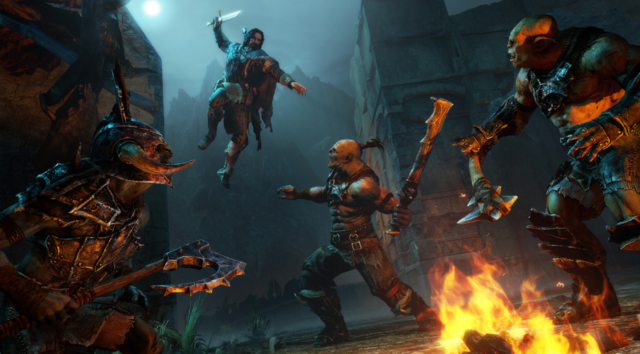
Openings in upper management now available!
Talion can find worms in the hierarchy of Uruks to interrogate, orders, and free slaves to gather information on the relationships between different Uruk leaders as well as identifying individual strengths and weaknesses of each Captain or Warchief such as invulnerability to arrows, vulnerability to stealth attacks, or fear of fire. This lets the player design surgical strikes against the Uruk army, both in catering individual attacks to orcs' weaknesses as well as maximizing the damage you can do to the army. If you discover a strong and weak Captain are in the midst of a power struggle, you can kill the stronger Uruk to cause the promotion of the weaker candidate to important positions such as a Warchief’s personal bodyguard. The structure really drives you to research and plan out where and how you want to strike, which is unbelievably rewarding when everything goes according to plan. Although if you die you can expect every enemy Uruk involved to get a huge promotion and a huge stat buff.
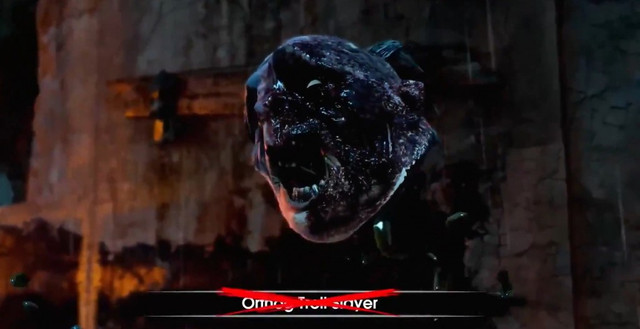
Measure twice, cut once
The gameplay of Shadow of Mordor should be pretty familiar to anyone who has picked up a console in the past 5 years. The free running system is straight out of Assassin’s Creed and the fighting is system is nearly a carbon copy of the Batman: Arkham series. A primal part of me desires to levy some sort of criticism toward the developers for taking elements from successful titles and combining them into a single game. Meanwhile, the rational part of me realizes that this is actually a great idea which, when executed successfully, actually makes an extremely fun title. The features are personalized to Talion and his struggles in Mordor, replacing Batman’s muay thai KOs with brutal sword executions, so the play is just as fun and thematic to Shadow of Mordor. Like a good action movie starring Bruce Willis, Monolith decided to make a strong title with tried and true features which, as it turns out, absolutely works.
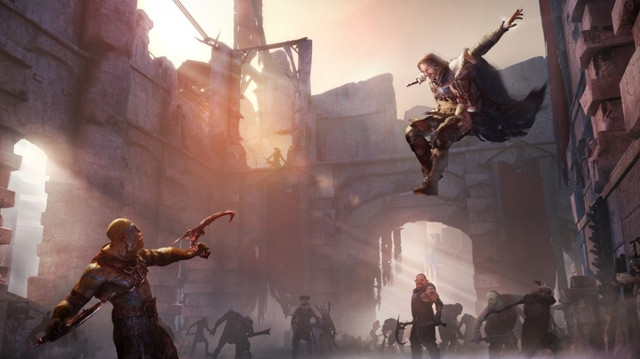
Aerial assassinations have been around since Tenchu... and are still cool
A feature in the gameplay which seems relatively unique to the title is the Domination system which is by far my favorite part of the game. Talion can use his wraith powers to mind-control Uruks to create his own army to battle the force Sauron is amassing deeper within Mordor. This, along with a few other gameplay elements, really let you prepare for conflict in a way you cannot in other titles. Sneaking around an orc stronghold, you can dominate key Uruks such as shield units, berserkers, and archers which you can turn to your aid when you reveal yourself. This sort of preparatory combat is something many titles claim to possess, but Shadow of Mordor is the first which I feel really nailed the execution. This can even be done to Captains and, through them, their squads. If you have gathered sufficient intel on the subordinates of a Warchief, you can turn all their Captains before targeting them to give yourself an overwhelming advantage.
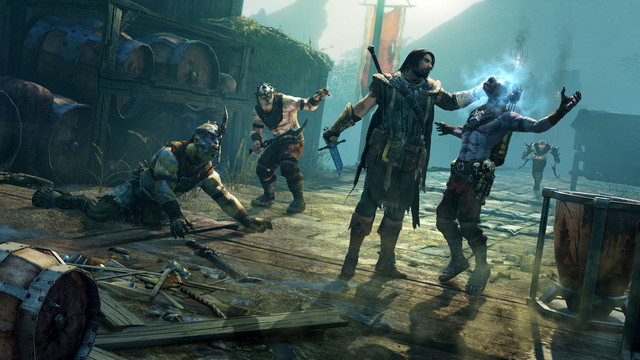
Your soul is mine!
My biggest issue with the game really doesn’t have anything to do with design choices, but the overall quality of the game. Although much of the gameplay is intuitive, which is not surprising given many of the features are borrowed from other popular titles, there are a considerable number of bugs and what seem like overlooked interactions. The free running, for example, meets industry standards, but you still encounter the dreaded ankle-high walls. Not tall enough for freerunning interaction, but still to high to step over, leaving you running into them like a solid surface and looking very stupid as Uruks quickly close in behind you. For all of my love of the Domination system, it is infuriating when you waste a valuable execution strike, accidentally killing one of your own allies. I’m not honestly sure if that was a conscious design decision, but allowing Talion to attack, grab, and execute dominated Uruks in fights which can become extremely hectic is a recipe for repeated disasters.
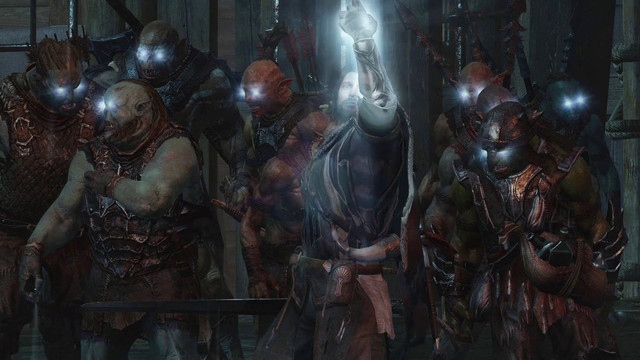
Good thing you guys are thralls, because I'm probably going to accidentally decapitate half of you
In addition to a number of unfortunate bugs and game interactions, there are a few quirky features in Shadow of Mordor which don’t quite fit. While the title is amazing as a standalone story, Monolith crammed a few open world and MMO features in the game which seem a little out of place. A Death Threat system was added which allows you to threaten Uruk leaders through their subordinates, which on the face of it seems like a very cool opportunity to introduce a little psychological warfare into what is an already strategic game. Instead it simply buffs the target of the threat in exchange for making them more likely to drop stronger runes you can attach to your weapons, which seems like a bizarre excuse to needlessly grind the game for better gear. Vengeance missions are also available which let you target Uruks who have killed other Shadow of Mordor players but are essentially no different from any other event mission to kill an Uruk Captain. Even now I’m unsure if they are notified if you have avenged them in their own game, but either way the interaction seems so indirect as to make me wonder why it was even included.
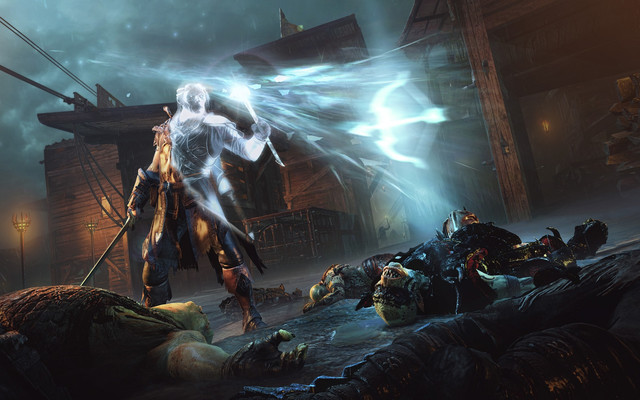
Pray to the benevolent RNG gods for an epic weapon rune
Looking at franchise-related video games as a point of comparison for Middle-earth: Shadow of Mordor has only increased my appreciation for the title. It is hard to argue that there are any virtues to direct movie tie-ins and Star Wars seems to be the only universe to have successfully made the transition from film to consoles with the KOTOR series. Given how expansive the Tolkien universe is, I can honestly say I wouldn’t mind seeing a lot more titles exploring other periods of Middle-earth’s history. Even as a standalone title, Monolith did an excellent job of knowing where to innovate and where to use established systems to make an excellent experience.
REVIEW ROUNDUP
+ Tried and true combat and free running systems, executed well
+ Target marking and intel system introduces a lot of strategy
+/- Decent story which introduces more elements of the Middle-earth universe
+/- A lot fun minor features like memory quests along with some unnecessary ones like vengeance missions and RNG buffs
- Suffers from a variety of bizarre bugs and interactions
No comments:
Post a Comment